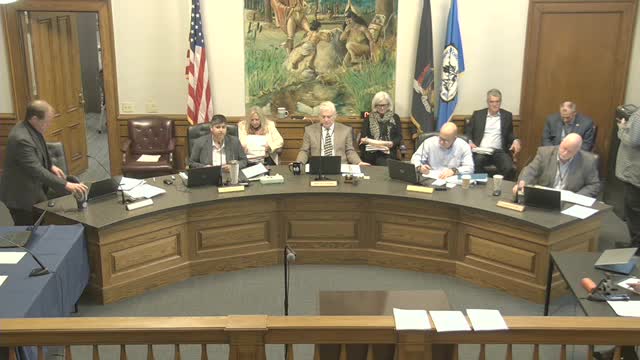Saratoga Springs budget workshop highlights short-term rental revenue, assessment gains and rising costs
Get AI-powered insights, summaries, and transcripts
Subscribe
Summary
At a budget workshop focused on accounts and finance, commissioners reviewed a conservative comprehensive budget, large increases in several expense categories and new short-term rental (STR) revenue estimates that officials say could help restore funding for nonprofits and public programs.
Saratoga Springs’ budget workshop on accounts and finance on an October meeting date focused on steep expense growth, updated assessment work and newly available short-term rental revenue projections that finance officials say could reduce the city’s projected shortfall.
Commissioner Moran, the finance commissioner, told the meeting that the city’s comprehensive budget (the conservative baseline used while officials work toward an amended budget) shows large cost increases: "These, we're not talking about rising costs of, like, 2%, 5%. We're talking about rising costs of, like, 188%, 226%." He highlighted increases in retirement costs, health insurance and liability insurance and said debt-service costs have also risen as borrowing and refinancings extend repayment timelines.
The finance commissioner said the comprehensive budget assumes about 30% of revenue from property tax and about 38% from non-property sources such as sales tax, mortgage tax and state or federal aid, while public safety would account for roughly 60% of expenses in the plan. He presented a set of options to close gaps including a proposed 2% property tax increase (equal to about $14 annually on a $100,000 assessed house), fee increases and new or expanded revenue streams such as paid parking changes and adjustments to special-event fees.
Accounts department director Brad, who also identified himself as city clerk and assessor, reviewed the accounts office functions and the department’s recommended cuts and revenue options. "Essentially, we collaborate with all city departments," he said, listing licensing and permitting, records retention, procurement, risk and safety, assessment work and elections administration. Brad said accounts’ 2022 expense base was about $1.32 million and the 2026 comprehensive figure is about $1.92 million, with reductions proposed in training, overtime, supplies and the risk and safety program.
Assessment work and enforcement were a major focus. Brad said the city has nearly 12,000 properties (about 9,800 residential) and has processed nearly 300 sales per year. He described a multi-year data-verification project that identified roughly $150 million of previously unassessed property in the last three years, generating about $1.5 million in revenue; he said another $20 million had been identified for the 2026 assessment roll and that roughly 2,400 properties remain to review.
Short-term rentals (STRs) featured prominently in the discussion. Commissioner Moran said the governor recently signed a state bill enabling an occupancy (bed) tax on STRs and that the city is assessing how much revenue to budget conservatively in the amended budget. The finance presentation included these estimates: occupancy tax revenue budgeted at $850,000 for 2025 and $900,000 for 2026 in the comprehensive budget; an STR registration/licensing fee forecast of roughly $500,000 to $700,000 depending on compliance rates; a separate estimated minimum of $250,000 from fire-inspection fees tied to STRs; and a projected $600,000 increase in incremental sales tax revenue the city could attribute to STR activity (used to move the sales tax estimate in the comprehensive budget from $20.0 million to $20.6 million).
Commissioner Moran and Brad described an STR monitoring dashboard the city is using. They reported 1,099 unique STR addresses identified in a recent snapshot, 1,600 total listings across platforms and an estimated universe of roughly 1,200 STR addresses once duplicate listings and address-ambiguous postings are accounted for. Moran proposed fee tiers tied to whether an STR is a primary residence (a $100 license fee) or a non-primary unit operated more like a business (a $750 license fee), arguing the city can lawfully treat those categories differently.
Moran presented a range of possible new annual revenue from STR-related sources and other fee changes of about $2.1 million to $2.8 million above the initial comprehensive-budget estimates, and he recommended restoring funding for local nonprofits and programs (including senior services and RISE) if that revenue materializes. He cautioned the estimates are conservative and contingent on compliance and data clarity from state and county collections; other commissioners noted there is no formal written agreement yet with the county on sharing any newly collected bed-tax revenue.
Special events and associated overtime costs were discussed as both a revenue source and an expense pressure. Brad and Department of Public Safety representatives explained that large events (Chowderfest, Belmont on Broadway, the July 4th celebration and others) bring tens of thousands of visitors and support local businesses but also increase overtime and safety costs. Finance and public safety staff said the city is reviewing special-event permit fees, late-application surcharges and surcharges for events requiring state route closures or mass-gathering permits from the New York State Department of Health.
Commissioners emphasized the conservative approach to the comprehensive budget: it uses revenue data lagging several months and omits newly enabled revenue streams until they are sufficiently certain. Multiple speakers said the amended budget, which follows departmental negotiation, is the appropriate place to incorporate additional revenue once it is reasonably verified.
The workshop concluded with a procedural motion to adjourn the budget-workshop session; the motion passed 5-0. The body then moved into the mayor's regular scheduled meeting.
